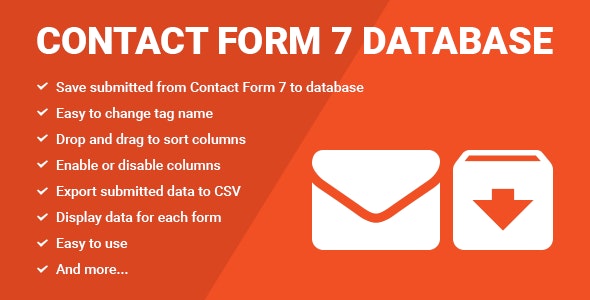
Database for Contact Form 7 GPL Plugin Free Download
Database for Contact Form 7 Free Download with GPL License , Free New Version. We Purchase And Download From Original Authors You’ll Receive Untouched And Unmodified Files. 100% Clean Files & Free From Virus, Unlimited Domain Usage.
A Database for Contact Form 7 is an essential extension that enhances the functionality of the popular WordPress plugin, Contact Form 7 (CF7). This extension addresses the need for storing and managing form submissions securely within a database, providing website owners and administrators with valuable insights, analytics, and a centralized location to access and organize user data. In this comprehensive guide, we’ll explore the key features, benefits, installation process, and use cases of the Database for Contact Form 7 plugin.
Key Features of Database for Contact Form 7
Submission Storage:
The primary feature of the Database for Contact Form 7 is the ability to store form submissions in a database. Instead of relying solely on email notifications, the plugin captures and retains user submissions in a structured format. This database serves as a reliable repository for all form data, ensuring that no information is lost, and administrators can access it at any time.
User-friendly Interface:
The plugin integrates seamlessly with the Contact Form 7 interface, maintaining a user-friendly and intuitive experience for website owners. Users can manage the database and view form submissions directly from the WordPress dashboard, eliminating the need for additional technical skills or external tools.
Export and Download Options:
Database for Contact Form 7 provides convenient export options, allowing administrators to download form submissions in various file formats. This feature is particularly useful for data analysis, reporting, or sharing information with other stakeholders outside the WordPress environment.
Search and Filter Functionality:
To streamline the process of accessing specific form submissions, the plugin includes search and filter functionalities. Users can easily search for submissions based on keywords, dates, or other custom criteria, making it efficient to locate and retrieve relevant data.
Customizable Views:
The plugin offers customizable views for form submissions, enabling users to choose which fields to display and in what order. This flexibility allows administrators to tailor the presentation of data to their specific needs, enhancing the overall usability of the database.
Data Privacy Compliance:
With growing concerns about data privacy, Database for Contact Form 7 prioritizes compliance by ensuring that stored data adheres to privacy regulations. Website owners can confidently manage user information in accordance with legal requirements, fostering trust with their audience.
Scheduled Database Optimization:
To maintain optimal performance, the plugin includes scheduled database optimization features. This ensures that the database remains efficient and responsive, even as the volume of form submissions grows over time.
Benefits of Using Database for Contact Form 7 GPL Plugin Free Download
Data Retention and Backup:
One of the primary advantages of using this plugin is the ability to retain and back up form submissions. In case of email failures or accidental deletions, having a centralized database ensures that valuable data is not lost and can be recovered easily.
Performance Tracking:
Database for Contact Form 7 enables website owners to track and analyze form submission trends over time. This information is valuable for understanding user behavior, identifying popular content or services, and making data-driven decisions to improve the overall performance of the website.
Efficient Data Management:
With search, filter, and customizable view features, the plugin facilitates efficient data management. Users can quickly locate specific submissions, analyze patterns, and extract valuable insights without the need for complex data manipulation.
Enhanced Security:
Storing form submissions in a secure database adds an extra layer of protection to user data. This is particularly important for websites that handle sensitive information, such as contact details or inquiries. Database for Contact Form 7 prioritizes data security, contributing to a safe online environment.
Streamlined Communication:
By centralizing form submissions, the plugin streamlines communication and collaboration among team members or departments. Multiple users with appropriate permissions can access the database, ensuring that everyone involved has the necessary information at their fingertips.
Custom Reporting:
The export options provided by the plugin empower users to create custom reports based on their specific requirements. This is beneficial for generating insights, sharing information with stakeholders, or integrating form submission data into broader analytics platforms.
Installation and Setup
Install Contact Form 7 GPL Plugin Free Download:
Before integrating the Database for Contact Form 7 plugin, ensure that the Contact Form 7 plugin is installed and activated on your WordPress site. This serves as the foundation for creating and managing forms.
Install Database for Contact Form 7:
Visit the WordPress dashboard and navigate to the “Plugins” section. Click on “Add New” and search for “Database for Contact Form 7.” Install and activate the plugin.
Configure Database Settings:
Once activated, go to the Contact Form 7 settings in the WordPress dashboard. You will now see a new tab labeled “Database” in the Contact Form 7 settings. Click on it to access the database configuration options.
Enable Database Storage:
Within the Database settings, you’ll find an option to enable or disable database storage for each specific form. Enable the database storage option for the forms you want to track and store submissions.
Configure Export and Display Settings:
Customize export options, including file formats and data filters, based on your preferences. Additionally, set up how form submissions are displayed in the WordPress dashboard, selecting the fields you want to include in the views.
Optimize Database Settings:
Configure scheduled database optimization settings to ensure the efficient performance of the database over time. This may include specifying the frequency of optimization and other related parameters.
Save Settings:
After configuring the plugin settings, save your changes. The Database for Contact Form 7 is now set up to store form submissions and provide access to the stored data.
Use Cases
Lead Generation:
For websites focused on lead generation, the plugin is instrumental in managing and analyzing contact form submissions. By tracking leads over time, businesses can refine their strategies and improve conversion rates.
Customer Support:
Websites offering customer support forms can use the database to track and manage user inquiries. This facilitates efficient communication and allows support teams to address common issues based on historical data.
Event Registrations: Event organizers can benefit from the database by tracking registrations and attendee details. This information can be crucial for planning future events, understanding attendee demographics, and enhancing the overall event experience.
Survey and Feedback Forms:
Websites collecting user feedback or conducting surveys can leverage the plugin to centralize and analyze responses. This helps in identifying trends, areas for improvement, and gauging overall user satisfaction.
Membership or Subscription Forms:
Websites with membership or subscription forms can use the database to manage user registrations. This includes tracking member details, subscription renewals, and other relevant information.
Job Application Forms:
Companies accepting job applications through their websites can benefit from the database for tracking applicant information. This simplifies the recruitment process and ensures that candidate data is easily accessible.
Best Practices
Regularly Back Up the Database:
While the plugin enhances data security, it’s essential to implement regular backups of the database to prevent data loss. WordPress backup plugins or hosting services can assist in creating periodic backups.
Optimize Database Regularly: Schedule regular database optimization to maintain optimal performance. This helps in preserving resources and ensures that the database remains responsive, even with a growing volume of form submissions.
Implement Data Privacy Measures: Stay informed about data privacy regulations and implement necessary measures to ensure compliance. This includes obtaining user consent, providing clear privacy policies, and securely handling sensitive information.
Monitor Database Size: Keep an eye on the database size, especially for websites with a high volume of form submissions. Excessive database size can impact website performance, and monitoring it allows for timely optimization.
Train Users and Administrators: If multiple users or administrators manage the website, provide training on how to use the Database for Contact Form 7 plugin. This ensures that everyone understands how to access and utilize the stored data effectively.
Conclusion
The Database for Contact Form 7 plugin is a valuable addition to the toolkit of WordPress website owners and administrators, especially those relying on Contact Form 7 for form creation. By seamlessly integrating with the popular form plugin, it enhances data management capabilities, offering a centralized location for storing, analyzing, and retrieving form submissions. This not only improves efficiency in handling user data but also provides valuable insights that can inform strategic decisions and optimizations. As websites continue to evolve, having a robust and secure database solution becomes increasingly crucial, and the Database for Contact Form 7 plugin addresses this need effectively.



